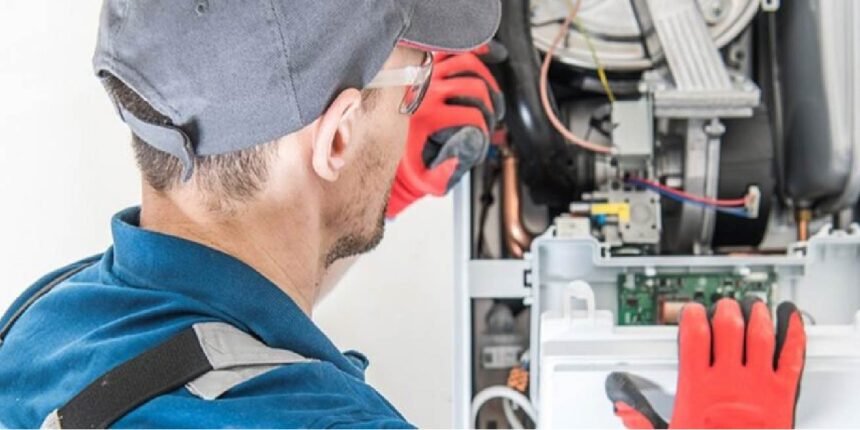When buying a new furnace, understanding the AFUE rating is crucial. AFUE, or Annual Fuel Utilization Efficiency, measures how efficiently your furnace converts fuel into heat. A higher AFUE means lower energy bills and reduced environmental impact. Knowing these ratings helps you make smarter, cost-saving decisions for your home heating system.
What AFUE Means and How It’s Measured
AFUE measures the percentage of fuel that gets converted into heat for your home over an entire heating season. A furnace with an 80% AFUE rating converts 80% of its fuel into heat, while the remaining 20% escapes through the venting system.
The measurement process involves controlled laboratory testing under standardized conditions. Technicians monitor fuel consumption, heat output, and heat loss through the venting system. These tests simulate typical operating conditions throughout a heating season, accounting for startup cycles, steady-state operation, and cool-down periods.
Modern furnaces typically range from 80% to 98% AFUE. Gas furnaces generally achieve higher ratings than oil furnaces, while electric furnaces can reach near 100% efficiency since they don’t lose heat through venting systems.
AFUE Ratings by Climate Zone
Different climates require different approaches to furnace efficiency. Your location significantly influences which AFUE rating provides the best value.
Cold Climates (Northern States)
Homeowners in regions with long, harsh winters should prioritize high-efficiency furnaces with AFUE ratings of 90% or higher. The extended heating season means greater fuel consumption, making efficiency improvements more valuable. Premium efficiency models (95-98% AFUE) often justify their higher upfront costs through substantial long-term savings.
Moderate Climates (Central States)
Mid-range AFUE ratings between 85-92% typically offer the sweet spot for moderate climates. These regions experience significant heating seasons but don’t endure the extreme cold that makes ultra-high efficiency essential. Furnace installations like those in Midvale often fall into this category, where balanced efficiency and cost considerations drive decision-making.
Mild Climates (Southern States)
Warmer regions with minimal heating requirements can often satisfy their needs with standard efficiency furnaces (80-85% AFUE). Since heating systems run infrequently, the energy savings from high-efficiency models may not offset their additional purchase price.
Factors That Affect AFUE Performance
Several variables influence how well your furnace achieves its rated AFUE in real-world conditions.
Installation Quality plays a crucial role in actual efficiency. Improperly sized ductwork, inadequate ventilation, or incorrect gas pressure can prevent your furnace from reaching its potential. Professional installation ensures optimal performance and validates warranty coverage.
Maintenance Frequency directly impacts efficiency over time. Dirty filters restrict airflow, forcing your furnace to work harder. Annual tune-ups maintain peak performance by cleaning burners, checking gas pressure, and inspecting heat exchangers.
Home Insulation affects how hard your furnace works to maintain comfortable temperatures. Well-insulated homes with sealed air leaks require less heating, allowing furnaces to operate more efficiently.
Thermostat Settings influence cycling patterns. Consistent temperatures promote steady-state operation, which typically achieves better efficiency than frequent temperature adjustments.
Benefits of High-Efficiency Furnaces
Investing in high-AFUE furnaces provides multiple advantages beyond simple energy savings.
Lower Operating Costs represent the most obvious benefit. A 95% AFUE furnace uses approximately 19% less fuel than an 80% AFUE model. Over a 15-year lifespan, these savings can total thousands of dollars.
Environmental Impact decreases with higher efficiency ratings. Reduced fuel consumption means fewer emissions, contributing to cleaner air and reduced carbon footprints.
Enhanced Comfort often accompanies high-efficiency models. Advanced features like variable-speed blowers provide more consistent temperatures and improved air circulation throughout your home.
Increased Home Value can result from efficiency upgrades. Energy-conscious buyers increasingly prioritize homes with efficient heating systems, potentially improving resale prospects.
AFUE vs. Other Efficiency Metrics
Understanding how AFUE relates to other efficiency measurements helps you evaluate complete HVAC systems.
SEER (Seasonal Energy Efficiency Ratio) applies to air conditioning systems and heat pumps. While AFUE measures heating efficiency, SEER evaluates cooling performance. Both ratings help assess year-round energy costs.
HSPF (Heating Seasonal Performance Factor) measures heat pump heating efficiency. Unlike AFUE, which applies only to combustion heating, HSPF evaluates electric heat pump performance during heating mode.
Energy Star Certification incorporates AFUE requirements along with additional performance criteria. Energy Star furnaces must meet minimum AFUE thresholds while demonstrating reliable operation and advanced features.
Maximizing Your Furnace’s Efficiency
Even the most efficient furnace won’t perform optimally without proper support systems and maintenance practices.
Regular Filter Changes maintain proper airflow and protect system components. Replace standard filters monthly during heating season, or follow manufacturer recommendations for high-efficiency filters.
Ductwork Inspection ensures heated air reaches its destination efficiently. Sealed, insulated ducts prevent heat loss and maintain proper system pressures.
Programmable Thermostats optimize heating schedules based on occupancy patterns. Smart thermostats can learn your preferences and automatically adjust temperatures for maximum efficiency.
Home Sealing reduces heating loads by preventing conditioned air from escaping. Weather stripping, caulking, and insulation improvements support furnace efficiency by reducing demand.
Conclusion
AFUE ratings guide furnace selection, but factors like climate, home features, and long-term plans also matter. High-efficiency models cost more upfront but save more in colder climates. Work with HVAC pros to balance efficiency and cost. Remember, performance depends on proper installation, maintenance, and home energy upgrades.







